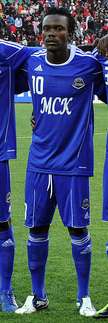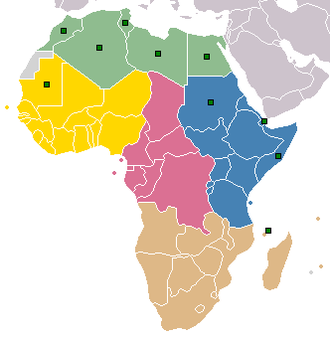African Nations Championship
The CAF African Nations Championship (French: Championnat d'Afrique des Nations, sometimes referred to as African Championship of Nations, CHAN, or Total African Nations Championship for sponsorship reasons) is a football tournament which was first announced on 11 September 2007.[1] It is administered by the Confederation of African Football (CAF) and is played between the best national teams of Africa, exclusively featuring players who are active in the national championships and qualified to play in the ongoing season. Expatriate players, regardless of where they play, even in Africa, are not qualified to take part in the tournament.
 | |
| Founded | 2009 |
|---|---|
| Region | Africa (CAF) |
| Number of teams | 16 |
| Current champions | |
| Most successful team(s) | |
| Website | www.cafonline.com |
| Tournaments | |
|---|---|
The first tournament was held in 2009. It was hosted by Ivory Coast and won by DR Congo. The competition was expanded to 16 teams for the second tournament, held in Sudan in 2011.[2][3] The tournament was won by Tunisia, in the wake of the Tunisian Revolution.[4]
The tournament is now held every even years,[5] alternating with the Africa Cup of Nations.
History
._(24820108021).jpg)
The creation of the African Nations Championship was a response to the desire to revive or strengthen national competitions regularly weakened by a mass exodus of top players who leave their home countries to play for foreign teams which will pay more and get them more media coverage. Starting from the 2014 edition onwards, all of the matches are recognized by FIFA as first team matches.[6][7]
Qualifying
The eight tournament spots, for the first edition in 2009, were allocated the following way:
- One each for North Zone, Zone West A, Zone West B, Centre Zone and Central-East Zone
- Two for the Southern Zone
- One for the host country of the final tournament[9]
Since the second edition, in 2011, 16 teams qualify for the tournament, allocated this way (including host country):
- 2 each for North Zone and Zone West A
- 3 each for Zone West B, Central Zone, Central-East Zone and Southern Zone[10]
Tournament format
The group stage of the African Nations Championship features pools of four teams drawn at random. The top two teams from each group advance to the knockout stage.
On 8 March 2009, Democratic Republic of the Congo defeated Ghana 2–0[11] to become the first winner of the tournament.
Results
Summaries
| Year | Host | Number of teams | Final | Third Place Match | ||||||
|---|---|---|---|---|---|---|---|---|---|---|
| Champion | Score | Second Place | Third Place | Score | Fourth Place | |||||
| 2009 Details |
8 | DR Congo |
2–0 | Ghana |
Zambia |
2–1 | Senegal | |||
| 2011 Details |
16 | Tunisia |
3–0 | Angola |
Sudan |
1–0 | Algeria | |||
| 2014 Details |
16 | Libya |
0 – 0 (4–3 pen.) |
Ghana |
Nigeria |
1–0 | Zimbabwe | |||
| 2016 Details |
16 | DR Congo |
3–0 | Mali |
Ivory Coast |
2–1 | Guinea | |||
| 2018 Details |
16 | Morocco |
4–0 | Nigeria |
Sudan |
1 – 1 (4–2 pen.) |
Libya | |||
| 2020 Details |
16 | Future event | Future event | |||||||
| 2022 Details |
TBD | Future event | Future event | |||||||
Performance by nation
| Team | Champions | Runners-up | Third-place | Fourth-place |
|---|---|---|---|---|
| 2 (2009, 2016) | – | – | – | |
| 1 (2014) | – | – | 1 (2018) | |
| 1 (2011) | – | – | - | |
| 1 (2018*) | – | – | – | |
| – | 2 (2009, 2014) | – | – | |
| – | 1 (2018) | 1 (2014) | – | |
| – | 1 (2011) | – | – | |
| – | 1 (2016) | – | – | |
| – | – | 2 (2011*, 2018) | – | |
| – | – | 1 (2016) | – | |
| – | – | 1 (2009) | – | |
| – | – | – | 1 (2011) | |
| – | – | – | 1 (2016) | |
| – | – | – | 1 (2009) | |
| – | – | – | 1 (2014) | |
* hosts.
Champions by region
| Federation (Region) | Champion(s) | Number |
|---|---|---|
| UNAF (North Africa) | Libya (1), Morocco (1), Tunisia (1) | 3 titles |
| UNIFFAC (Central Africa) | DR Congo (2) | 2 titles |
| WAFU (West Africa) | None | 0 titles |
| CECAFA (East Africa) | None | 0 titles |
| COSAFA (Southern Africa) | None | 0 titles |
Hat-tricks

A hat-trick is achieved when the same player scores three or more goals in one match. Listed in chronological order.
| Sequence |
Player | No. of goals |
Time of goals | Representing | Final score |
Opponent | Tournament | Round | Date |
|---|---|---|---|---|---|---|---|---|---|
| 1. | Given Singuluma | 3 | 36', 49', 50' | 3–0 | 2009 | Group stage | 22 February 2009 | ||
| 2. | Chisom Chikatara | 3 | 75', 81', 90' | 4–1 | 2016 | Group stage | 18 January 2016 | ||
| 3. | Ayoub El Kaabi | 3 | 27', 65', 68' | 3–1 | 2018 | Group stage | 17 January 2018 | ||
Participating nations
| Team | 2009 |
2011 |
2014 |
2016 |
2018 |
2020 |
2022 | Years |
|---|---|---|---|---|---|---|---|---|
| 4th | q | 2 | ||||||
| 2nd | GS | QF | 3 | |||||
| GS | GS | q | 3 | |||||
| GS | 1 | |||||||
| QF | QF | GS | q | 4 | ||||
| GS | QF | q | 3 | |||||
| 1st | QF | QF | 1st | q | 5 | |||
| GS | GS | 3rd | GS | 4 | ||||
| GS | 1 | |||||||
| GS | GS | 2 | ||||||
| GS | QF | GS | 3 | |||||
| 2nd | GS | 2nd | 3 | |||||
| 4th | GS | q | 3 | |||||
| GS | 1st | 4th | 3 | |||||
| GS | QF | 2nd | q | 4 | ||||
| GS | GS | 2 | ||||||
| QF | GS | 1st | q | 4 | ||||
| GS | 1 | |||||||
| QF | q | 2 | ||||||
| QF | GS | q | 3 | |||||
| 3rd | GS | 2nd | 3 | |||||
| GS | QF | GS | q | 4 | ||||
| 4th | GS | 2 | ||||||
| QF | GS | 2 | ||||||
| 3rd | 3rd | 2 | ||||||
| GS | q | 2 | ||||||
| q | 1 | |||||||
| 1st | QF | q | 3 | |||||
| GS | GS | GS | GS | q | 5 | |||
| 3rd | QF | QF | q | 4 | ||||
| GS | GS | 4th | GS | q | 5 | |||
| Total | 8 | 16 | 16 | 16 | 16 | 16 |
- Legend
|
|
References
- "New tournament for Africa". BBC Sport. 11 September 2007.
- Sannie, Ibrahim (28 February 2009). "CAF plans to expand CHAN". BBC Sport. Retrieved 21 May 2009.
- "CAF Executive Committee Decisions". Cafonline. 19 September 2009. Archived from the original on 18 December 2008. Retrieved 21 July 2010.
- "Tunisia beat Angola in the CHAN final in Sudan". BBC Sport. 25 February 2011. Retrieved 1 March 2011.
- "Ghana 'favourites' to host 2018 CHAN after WAFU Nations Cup success". social_image. Retrieved 27 November 2017.
- "African Nations Championship in Rwanda gives domestic talent a chance". The Guardian. 15 January 2016. Retrieved 19 June 2016.
- "Nigeria 'do not have A and B teams' says Oliseh ahead of Nations Championship". The National. 15 January 2016. Retrieved 19 June 2016.
- AfricaNews (18 April 2017). "Total to sponsor CAF competitions for the next eight years". Africanews. Retrieved 18 April 2017.
- CAF Online: New Competition launched : African Championship of Nations Archived November 21, 2007, at the Wayback Machine
- "Archived copy". Archived from the original on 12 October 2017. Retrieved 4 March 2013.CS1 maint: archived copy as title (link)
- "DR Congo lift CHAN trophy". BBC Sport. 8 March 2009.
- "Decisions of CAF Executive Commitee [sic] - 27 & 28 September 2018". CAF. 29 September 2018.

